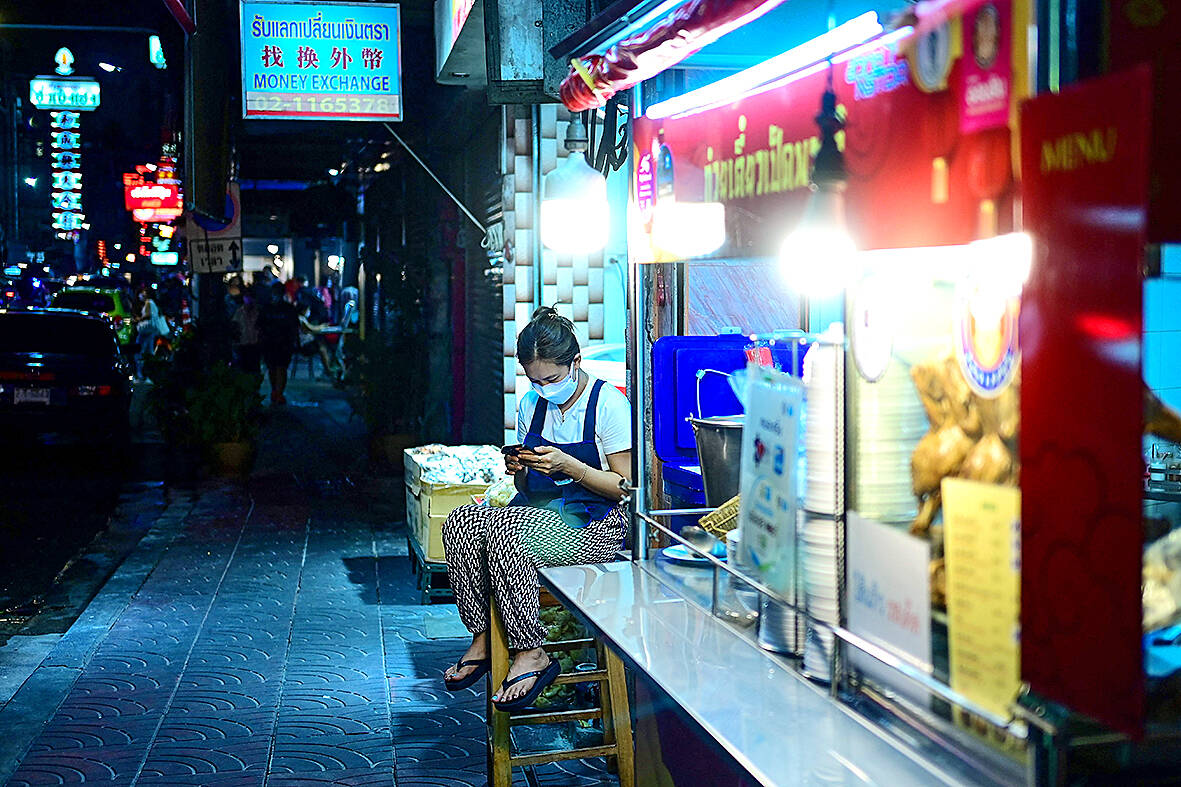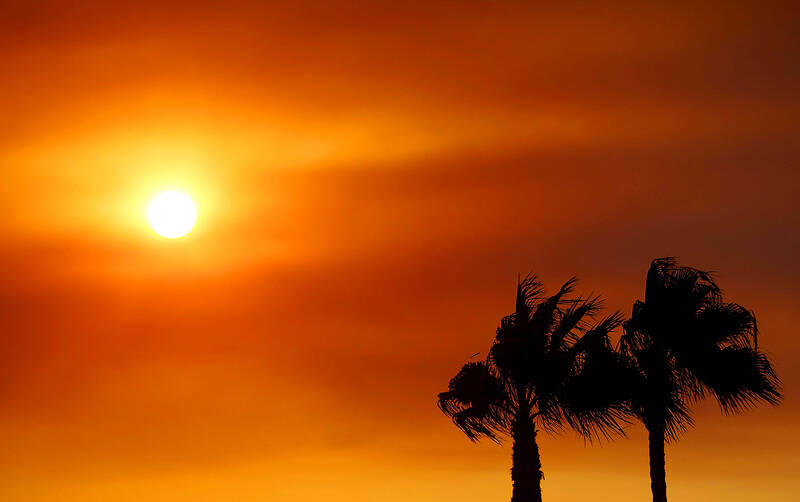There’s no shortage of bad news in the media to “doomscroll,” from a global pandemic to the war in Ukraine and an impending climate crisis, but new research suggests the compulsive urge to surf the Web can lead to poor mental and physical health outcomes.
Doomscrolling is the tendency to “continue to surf or scroll through bad news, even though that news is saddening, disheartening or depressing,” a practice researchers found has boomed since the onset of the COVID pandemic.
The study, published in the journal Health Communication, found 16.5 percent of about 1,100 people surveyed showed signs of “severely problematic” news consumption, leading to greater levels stress, anxiety and poor health.

Photo: AFP
Associate professor Bryan McLaughlin, the study’s lead author and a researcher at Texas Tech University, said the 24-hour-news cycle could bring about a “constant state of high alert” in some people, making the world seem like a “dark and dangerous place.”
“For these individuals, a vicious cycle can develop in which, rather than tuning out, they become drawn further in, obsessing over the news and checking for updates around the clock to alleviate their emotional distress,” he said.
“But it doesn’t help, and the more they check the news, the more it begins to interfere with other aspects of their lives.”

Photo: AP
About 27.3 percent of those surveyed reported “moderately problematic” levels of news consumption, 27.5 percent were minimally impacted and 28.7 percent experienced no problems.
While some readers can comfortably receive news updates without any tangible psychological effects, others demonstrate a more compulsive obsession with the media, and struggle to detach themselves from the bad news they’re reading.
These respondents scored high on five problematic news consumption dimensions listed by the researchers: becoming absorbed in news content, being preoccupied with thoughts about the news, attempting to reduce anxiety by consuming more news, finding it difficult to avoid the news and having news consumption interfere in their daily life.

Photo: AFP
And those with higher levels of problematic news consumption were “significantly more likely” to experience poor mental and physical health, the survey found, even when controlling for demographics, personality traits and overall news use.
Of those with severely problematic consumption levels, 74 percent reported experiencing mental health problems and 61 percent reported physical problems compared to 8 percent and 6.1 percent of all other study participants.
“We did anticipate that a sizable portion of our sample would show signs of problematic news consumption. However, we were surprised to find that 17 percent of study participants suffer from the most severe level,” McLaughlin said.
“This is certainly concerning and suggests the problem may be more widespread than we expected. A lot of people appear to be experiencing significant amounts of anxiety and stress due to their news consumption habits.”
Kate Mannell, a media studies researcher at Deakin University in the Australian state of Victoria, said COVID-19 made the public “more inclined” to engage in doomscrolling because of the amount of bad news, coupled with extra spare time.
Mannell studied the impact of news consumption on Victorians affected by strict COVID-19 lockdowns in 2020. She found partial news avoidance was beneficial for the well being of surveyed participants, who reported being less distracted and calmer at home.
“People weren’t avoiding it completely, but were taking conscious steps to limit their news consumption after realizing [it] had become unhealthy,” she said.
“They found strategic ways of staying informed … doing one longer form piece of news engagement or going directly to public health.”
Mannell said for news addicts the key was acknowledging when it became detrimental to health, rather than encouraging people to switch off media entirely.
“We’re in an unstable world,” she said. “We’re going to have increasing climate catastrophes — crisis contexts in place around COVID are going to become more prevalent.
“Becoming stressed and anxious is a legitimate natural reaction to the world around you, but it’s important … people are able to gauge when [news consumption] becomes problematic.”

Jacques Poissant’s suffering stopped the day he asked his daughter if it would be “cowardly to ask to be helped to die.” The retired Canadian insurance adviser was 93, and “was wasting away” after a long battle with prostate cancer. “He no longer had any zest for life,” Josee Poissant said. Last year her mother made the same choice at 96 when she realized she would not be getting out of hospital. She died surrounded by her children and their partners listening to the music she loved. “She was at peace. She sang until she went to sleep.” Josee Poissant remembers it as a beautiful

March 2 to March 8 Gunfire rang out along the shore of the frontline island of Lieyu (烈嶼) on a foggy afternoon on March 7, 1987. By the time it was over, about 20 unarmed Vietnamese refugees — men, women, elderly and children — were dead. They were hastily buried, followed by decades of silence. Months later, opposition politicians and journalists tried to uncover what had happened, but conflicting accounts only deepened the confusion. One version suggested that government troops had mistakenly killed their own operatives attempting to return home from Vietnam. The military maintained that the

Before the last section of the round-the-island railway was electrified, one old blue train still chugged back and forth between Pingtung County’s Fangliao (枋寮) and Taitung (台東) stations once a day. It was so slow, was so hot (it had no air conditioning) and covered such a short distance, that the low fare still failed to attract many riders. This relic of the past was finally retired when the South Link Line was fully electrified on Dec. 23, 2020. A wave of nostalgia surrounded the termination of the Ordinary Train service, as these train carriages had been in use for decades

Lori Sepich smoked for years and sometimes skipped taking her blood pressure medicine. But she never thought she’d have a heart attack. The possibility “just wasn’t registering with me,” said the 64-year-old from Memphis, Tennessee, who suffered two of them 13 years apart. She’s far from alone. More than 60 million women in the US live with cardiovascular disease, which includes heart disease as well as stroke, heart failure and atrial fibrillation. And despite the myth that heart attacks mostly strike men, women are vulnerable too. Overall in the US, 1 in 5 women dies of cardiovascular disease each year, 37,000 of them